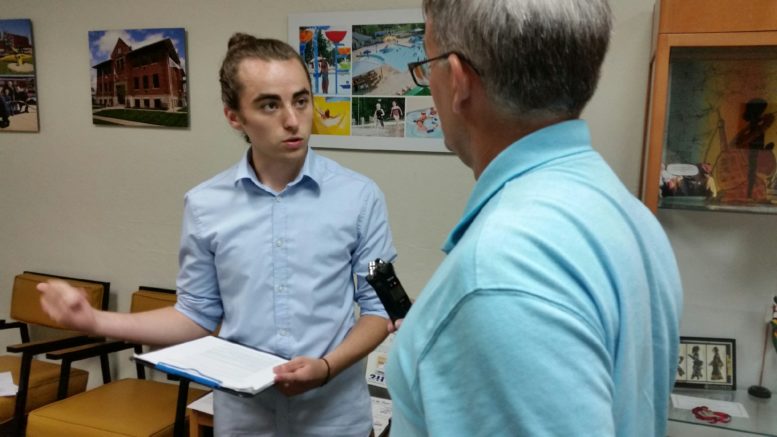By JAN LARSON McLAUGHLIN
BG Independent News
The petition to get a pipeline issue on Bowling Green’s November ballot cleared its first hurdle Friday – just barely. A total of 1,230 signatures were collected on the petition. By law, to make it on the ballot, the petition needed 714 valid signatures. It had 715.
But two other hurdles remain.
The second hurdle involves timing. There is some question if the pipeline petition was filed too late. There are different deadlines depending on the type of petition, so that issue will likely be decided by the Wood County Prosecutor’s Office.
The third hurdle involves content. It’s possible the petition won’t make the November ballot because it asks for powers that the city may not have the authority to give. Under Ohio House Bill 463, passed last year, the petition may not be within the purview of the city and may create constitutional conflicts.
It will be up to the Wood County Prosecutor’s Office to also determine whether or not the charter amendment meets H.B. 463 requirements.
“We’re going to take all this to them as we go through the process,” explained Terry Burton, director of the Wood County Board of Elections.
Since the house bill is so new, it may take time to get an answer. But Burton said he is anxious to get a decision on the matter.
“I just want to set my ballots,” he said.
Burton said the 515 invalid signatures on the petitions were a combination of duplicate signatures, illegible signatures, incomplete addresses, printed signatures, and signatures from people outside the city. He said board of election employees make several searches before rejecting signatures as invalid.
But since the petitions had one more than the required number, the process moves onto the next issues.
City Attorney Mike Marsh said it will be up to the county prosecutor’s office – not the city – to rule whether or not the petition was filed on time, and if the language of the charter amendment meets standards.
“We were never consulted on any part of this,” Marsh said about the petitions. “Whatever the county prosecutor says, I will be completely in support of.”
The language of the proposed charter amendment is difficult to wade through, so the organization that filed the petition addressed each point in simpler terms. The petition calls for:
- Right to a healthy environment and livable climate. Bowling Green residents and the environment have the right to safe air, water, and land without contamination caused by oil and gas infrastructure projects (such as pipelines); this legislation does not restrict oil/gas consumption by Bowling Green residents.
- Right to enforcement. Bowling Green residents can non-violently enforce those rights if city officials and/or local courts do not; it cannot be deemed illegal for community members to attempt to peacefully enforce these rights.
- Right to enforcement against corporate rights. Corporations and business entities are denied personhood status in the eyes of the law if they violate the rights of people and nature protected by this amendment, and such entities are restricted from interfering with or overturning the rights expressed in this legislation.
- Right of local community self-government. Bowling Green residents can exercise their historically fundamental right of local community self-government to overturn unjust laws.
- Right of initiative lawmaking. Bowling Green residents possess the right to legislate in their own interest, including the ability to alter the law for the sake of strengthening and expanding their rights as expressed in this legislation.
Lisa Kochheiser, one of the petition organizers, said the charter amendment gives city residents a right to “peacefully enforce these rights.” That means, according to Kochheiser, giving people the right to hold sit-ins or put up blockades on roads to prevent deliveries.
“We’re talking about peaceful demonstration kind of stuff,” she said. “To try to stand up for our rights.”
Kochheiser said Bowling Green residents could do those types of protest now – but they would risk arrest. This charter amendment would make those actions legal.
“We want the right to say ‘no’ to harmful projects – that we don’t currently have,” she said.
“They harm people,” Kochheiser said of gas pipeline projects. “I can’t just sit down and not fight it. This would give us a way to say ‘no’ to projects that most people don’t want.”
Bowling Green Assistant Municipal Administrator Joe Fawcett said the language of the charter amendment does raise some questions.
“If this goes on the ballot and gets passed by the residents, we will need to have some meetings” to determine exactly what the language means for the city and its citizens, Fawcett said.
The city has no official opinion on the charter amendment, Fawcett said.
“Our position all along has been that we had to hold it for 10 days and turn it in to the board of elections,” he said, noting the city properly followed the requirements.
Earlier this week, attorney Terry Lodge, acting on behalf of Bowling Green Climate Protectors charter amendment group, requested that Wood County Board of Elections reject the new H.B. 463 requirements, which “attempt to overrule the longstanding constitutional right of voters to vote on any measure where the sponsors have gathered enough signatures to place it on the ballot. “
According to Kochheiser, constitutional conflicts exist, but not on the part of the petitioners.
“The conflicts lie on the part of the city, the board of elections, the county prosecutor, and anyone else who would take part in making a decision based on an illegal, unconstitutional law that would strip Bowling Green residents of their right to protect their health and safety and water supply,” Kochheiser said. “That is where the real constitutional conflicts lie.”
Lodge said that H.B. 463 strips away that historically reserved right to citizen-led initiative which empowers citizens to change the law when it no longer protects the health, safety, and welfare of the people. He also said the bill that changed Ohio’s century-old constitutional right to initiative is under challenge. The bill was passed into law last December by a “lame duck” session of the General Assembly.
The changes were bundled into a much larger legislative proposal that altered Ohio real estate laws. It is likely that many, if not most, legislators were unaware of the damage caused to the initiative right, according to Lodge.
“Saying if something is constitutional is a matter for the people to decide,” Kochheiser said.





